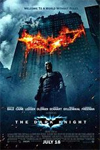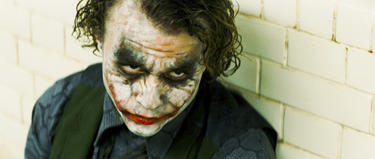2008
Main Movie
Page
Atonement
Boy in the Striped Pajamas
Brideshead Revisited
Counterfeiters
The Dark Knight
Enchanted
Frozen River
Indiana Jones and the Kingdom of the Crystal Skull
Iron Man
Juno
Man on Wire
Michael Clayton
No Country
for Old Men
Rachel Getting Married
the Savages
The Secret Life of Bees
Sweeney Todd
There Will Be Blood
The Visitor
WALL-E
Film
Reviews from 2007
Film Reviews
from 2006
The Dark Knight, the second of the current series of Batman films, has been the most anticipated movie event of the summer by far. Bolstered by strong reviews, The Dark Knight shattered box office records in its opening weekend. While it is well crafted and, at times, thought provoking, I don’t think it lives up to its hype. It’s overly long, very dark, and too muddled to be totally satisfying. The Dark Knight is certainly ambitious in its scope. Gotham City (surprisingly filmed in Chicago, not New York) has become overrun with organized crime and internal corruption. Aaron Eckhart plays Harvey Dent, the new district attorney, who pledges to clean up the city. The mysterious Joker (the late Heath Ledger) appears out of nowhere, owing allegiance to no one. He operates as his own agent, with his only motive to be an agent of chaos and anarchy. In this way, he parallels Batman, who operates as an independent agent on behalf of the police and city. Much is made of the comparison of the two. As Joker sneers to Batman, “You complete me.”
The dark tone of the film delves deep into the mythology of Batman, so that, by the end he even becomes a quasi-Messiah figure. As Christ, the Messiah, took on our sins, Batman willingly takes on the label of one who has crossed over to the dark side, becoming tainted with corruption and even murder. He disappears into the night, sure to return in a sequel in a couple of years. Batman acknowledges that he is not perfect; he has sinned. Yet he still argues that people are basically good, as opposed to the Joker, who claims that, when the going gets tough, it doesn’t take much to push people over the edge to do evil. Dark Knight is so dark, that it loses its comic book sense of fun. There’s almost no humor in the 2 ½ hour film. Michael Caine adds a welcome human touch as Albert, Bruce Wayne’s devoted manservant and confidant. As for Heath Ledger as the Joker, he is certainly less “over-the-top” than Jack Nicholson in the 1989 film. Ledger plays Joker more like a sadistic punk (reportedly his inspiration was Alex in A Clockwork Orange) than a comic book villain. Underneath the smeared-on makeup is a victim of violence himself, and Joker doesn’t hesitate to tell his story, even if his versions vary. He’s not beyond wanting his audience to “feel his pain.” I am mystified as to how the Joker had such control over others. Granted, there is the bizarre makeup, and the devil-may-care attitude, completely lacking in remorse. Not to mention the fact that he loves his knives, and various other weapons. Yet he seems more strange than frightening. As much as I have admired Ledger’s earlier work in his tragically brief career, I’m sorry to say that I just didn’t find his Joker that memorable. Earlier this year, I criticized Iron Man for not going deep enough into the psychology of its hero. If anything, Dark Knight goes too far in the opposite extreme. I longed for some of the chemistry between Gwyneth Paltrow and Robert Downey, Jr., that did not exist between Christian Bale’s Bruce Wayne and Maggie Gyllenhaal as his love interest Rachel. Rachel is torn between Bruce and Harvey Dent, until Dent becomes hideously disfigured and evolves into the villainous Two Face. Much screen time is given to Dent/Two Face. Two much, I think. It should have been saved for a sequel. Dark Knight certainly has its exciting moments, and interesting
ruminations on the nature of good and evil. Unfortunately, they
are bogged down in a long, loud movie that ultimately wore me down. |
The USCCB Office for Film & Broadcasting
classification is A-III -- adults. The Motion Picture Association of
America rating is PG-13 -- parents strongly cautioned. Some material
may be inappropriate for children under 13. |
subscribe to
DomLife.org and receive a free email update every two weeks. unsubscribe |



 The Dark Knight
The Dark Knight Dark Knight opens with a bang, as Joker orchestrates a bank
robbery. A subplot involving a Chinese man who finances underworld
operations is overly long, ending in a Hong Kong sequence that looks
more like something out of Mission: Impossible. Then the
film returns to Gotham City with more than its share of orchestrated
mayhem, including car chases, crowd scenes, and explosions. Director
Christopher Nolan handles all this with an efficient, if not inspired,
hand.
Dark Knight opens with a bang, as Joker orchestrates a bank
robbery. A subplot involving a Chinese man who finances underworld
operations is overly long, ending in a Hong Kong sequence that looks
more like something out of Mission: Impossible. Then the
film returns to Gotham City with more than its share of orchestrated
mayhem, including car chases, crowd scenes, and explosions. Director
Christopher Nolan handles all this with an efficient, if not inspired,
hand.